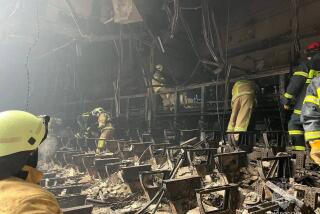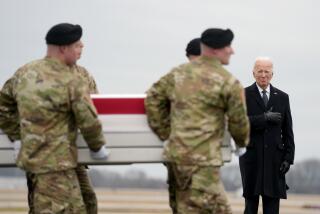After Istanbul airport attack, officials say Turkey’s next move depends on the U.S.
The three suicide bombers who attacked Istanbul’s airport this week were from Dagestan, a small and violence-wracked republic in Russia’s north Caucasus, and two central Asian states, Uzbekistan and Kyrgyzstan, Turkish authorities said Thursday.
They were part of a bigger group of possibly seven men, all suspected of an affiliation with the militant group Islamic State, who used assault rifles and suicide belts to kill travelers, airport employees, taxi drivers and police, authorities said.
Turkish police staged raids in Istanbul and Izmir on Thursday, detaining 22 people also suspected of links with Islamic State, among them nine Turkish nationals and four foreigners.
Authorities believe the airport assault on Tuesday, which left 44 people dead, was the fourth significant attack mounted by the Syria-based militant group in Istanbul alone this year. But whether Turkey is prepared to make a decisive move against the group operating just across its border depends on a host of complicated regional questions that have long plagued the 5-year-old civil war in Syria.
Turkish government officials say a coordinated response depends mainly on the United States, which thus far has refused to support any major international operation in Syria that goes beyond high-altitude airstrikes and military advisors to assist Kurdish militia fighting the extremists on the ground.
Responding to questions here, Turkish officials said they were disappointed by what they viewed as a tepid U.S. reaction to the airport assault and Washington’s failure to consider an all-out drive by the U.S.-led coalition, up to and including deploying ground troops to drive out the militants.
After the attack, President Obama’s first reaction was to offer U.S. help in the investigation of the bombing, but that fell far short of expectations here. “It’s not about the investigation. It’s about tackling these guys head on,” said a senior Turkish official, speaking on condition of anonymity.
Obama again appeared to disappoint Turkish officials in a formal statement in Ottawa on Thursday. After extending his “deepest condolences” to Turkey and saying he was “heartbroken” by the images of the dead and wounded, he spoke of America’s “strong commitment” to partner with Turkey, NATO and a U.S.-led alliance to fight Islamic State.
“This is not the proper way to deal with a terrorism threat on such a scale,” the official said. “If an attack on Ankara or Istanbul doesn’t shake world opinion like an attack on Brussels or Paris did, something is wrong. We need to see more solidarity.”
The U.S. currently provides air cover and ground advisors to a Kurdish militia and allied Arab tribal fighters as they slowly wrest territory from Islamic State in northern Syria. But it has limited its use of force against the government of Syrian President Bashar Assad to providing covert U.S. aid to moderate rebel groups.
The U.S. has insisted that Syrians and Iraqis are best equipped to take back control of their own countries.
“One of the fundamental tenets of U.S. policy is to create a durable solution,” a U.S. official told the Los Angeles Times, speaking on condition of anonymity. “We are not going to have a durable solution to the problem if the combat is done by non-local forces.... It will be a recruitment magnet” for extremist groups.
But many analysts here think that Islamic State’s very survival in the face of a long-running U.S.-led air campaign is serving as a recruitment magnet, and that every spectacular terrorist act it carries out adds to its attraction.
Turkey views the U.S. commitment to local forces all the more skeptically because American support centers on the YPG People’s Protection Force militia in Syria, a group Turkey views as an extension of the Kurdistan Workers Party, with which Ankara is now locked in a small war in southeastern Turkey.
In Washington, CIA director John Brennan, at a forum sponsored by the Council on Foreign Relations, said Islamic State appears to have been deliberate in not claiming responsibility for recent attacks in Turkey.
“They carry out these attacks to gain the benefits … in terms of sending a signal to our Turkish partners,” he said. At the same time, he added, they may not actually claim responsibility in order to avoid alienating “some of those individuals inside Turkey they may still want to gain the support of.”
Some U.S. analysts suggest that the airport strike could actually have the effect of improving cooperation between the U.S. and Turkey in the fight against Islamic State.
“ISIS, in trying to blow up the airport, may have been hoping to blow up Turkish-U.S. relations, but the opposite is probably true,” said Henri Barkey, a Turkish expert and director of the Middle East program at the Wilson Center, a Washington think tank. “It is not that relations will be better, but it could strengthen the U.S. hand and make Turkey see that [Islamic State] is the real threat.”
Turks fret that the U.S. has constructed a policy that has little chance of bringing stability to Syria.
Turkey has also been critical of the U.S. failure to respond to Russia’s air intervention in Syria, a development which has allowed Russia and the Syrian government to bombard schools, hospitals, mosques and even U.S.-backed rebel forces with impunity.
U.S. officials say Turkey for its part has failed to adequately support the ground drive against Islamic State in Syria. They note that the government in Ankara up until last year turned a blind eye to the movement of Islamic extremists crossing in and out of Syria from Turkey.
But the issue of changing strategy in the fight against Islamic State may be a question of timing. “First and foremost, it is in an election year in the U.S.,” the senior Turkish official noted. If there is any change, “it will be up to the United States to take the lead,” he said. And no one here expects any policy shifts before the election.
For now, it appears that Turkey will focus not on military action but on police work. And the initial results indicate that the latest attack can be resolved if not avenged.
Several news organizations named Ahmed Chatayev, a Dagestan native who’s been linked to other terrorist attacks, as the main organizer of the airport assault, but it was not clear whether he was one of those who self-detonated or escaped.
According to a number of news outlets quoting Turkish law enforcement sources, the three suicide bombers had rented an apartment in Fatih, a central Istanbul district which now has many Syrian residents, in late May, and had little contact with their neighbors.
Shortly after 8:30 pm. Tuesday night, the three men, carrying backpacks and a wheeled suitcase, walked to the Aksaray stop on the Istanbul subway. After dropping papers in a refuse container, they got in a taxi 15 minutes later and asked the driver in Turkish to go to the airport.
Upon, arriving, they unpacked suicide vests from the suitcase, and went in three directions to carry out the attack, according to the newspaper Hurriyet. One went into the airport parking garage, but he drew attention from a police officer who noticed he was wearing a coat on a hot summer’s night. Asked for his papers, the attacker opened fire, then fled to an upper floor where he self-detonated.
A second man went toward the departure terminal, but was spotted by police and shot. He still managed to detonate the suicide bomb, causing damage at the front of the terminal and inside but no deaths.
The third went to the arrivals terminal and apparently entered the security checkpoint at the main entrance, where he began to shoot at passengers. A customs officer shot at him but died when the attacker set off the suicide vest. The force of the explosion blew down the ceiling tiles, broke glass all over the main arrivals area, and appears to be the main cause of death and destruction.
Times staff writer Tracy Wilkinson contributed from Washington.
Gutman is a special correspondent.
ALSO
U.S.-backed rebels launched their first attack against Islamic State. They lost.
President Obama’s militant kill list doesn’t end at Osama bin Laden
Here’s what has to happen before Britain can leave the EU
UPDATES:
4:20 p.m.: This article was updated throughout.
11:02 a.m.: This article was updated with staff reporting throughout.
This article was originally published at 4:25 a.m.
More to Read
Start your day right
Sign up for Essential California for news, features and recommendations from the L.A. Times and beyond in your inbox six days a week.
You may occasionally receive promotional content from the Los Angeles Times.






